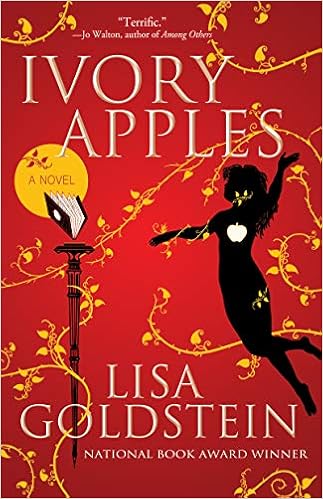 Reviewed by Christine Jacques
Reviewed by Christine Jacques
Ivory Apples
Lisa Goldstein
Tachyon Publications, 2019
Genre: Science Fiction
Ivy Quinn, her three sisters and her widowed father are sworn to secrecy. No one can know that their Great-Aunt Maeve, known to the world as Adela Madden, is the author of Ivory Apples, a wildly successful fantasy classic. Forty years after publication, the reading public can’t get enough of the quirky Pommerie Town, including an annual conference and a robust online presence. What inspired such a masterpiece? A godly source for art and philosophy: a muse. If a muse finds you worthy, it may give you the gift of divine inspiration in your art. Aunt Maeve hosts a tribe of muses in a grove near her home. On the Quinns’ monthly visit, Ivy unexpectedly finds favor with a muse named Piper. He renders Ivy’s English homework into MFA-level work, raising teacherly accusations about plagiarism that Ivy can honestly deflect.
This is life for the Quinns and Aunt Maeve until one of those fans barges onto the scene. Kate Burden desperately wants a muse of her own, enough to kill the paterfamilias and seize control of the Quinn ménage. Burden’s increasing abuse finally forces Ivy out of the house. The words Goldstein puts in Burden’s vicious mouth and the Quinn sisters’ dumb acceptance are Ivory’s true horror.
But Ivy has her muse, directing her and at times taking over her body. Their kinship is the source of a magical flood of poetry bursting from Ivy. Piper steals for her, amuses her, and wards off attackers through his charm: “People shouted insults or set their dogs on me, though the dogs seemed to sense Piper’s presence and wagged their tails with delight instead of attacking.” Goldstein makes “heightened, clarified, shining with its own light” homelessness seem almost attractive.
Ivy emerges from her bliss only when Piper sets her to driving a stolen car to Aunt Maeve’s house for the first time in two years. The return is not pretty. Without groceries and bank runs, the queenly Aunt Maeve’s circumstances can only be described as squalid. It’s time for Ivy to come home. This last phase of Ivy’s heroic journey weaves the disparate yarns together, through a Muse underworld, an enchanted warehouse imprisoning the remaining sisters, to the grove where Ivy first met Piper. There, Burden’s single-minded pursuit results in a very brief and fiery Pyrrhic victory. Unable to accept that muses choose their subjects, she demands too much in the final showdown. In true Greek fashion, this ending proves a rebirth for Ivy, including a shot at real love.
Readers lacking a hotline to Hesiod can raise skeptical eyebrows at the timeframe. Ivy’s school would have chased down a missing middle-class student whose father teaches at a university. Aunt Maeve’s royalty checks must have gone stale, and even queens need to eat over two years. Why didn’t Mr. Quinn defend his family against Ms. Burden?
Who knows. In Ivory, Goldstein has created a place that exists only on its own terms. There is no bridge or overlap; Ivy’s different lives exist side by side. She moves from one to the other with little effort because no effort is necessary. Ivy is able to deal with the chaos that comes with the talent attractive to a muse. She works for her eventual happiness, without sacrificing herself. This is why Piper found her worthy, and why Burden was doomed to fail.
Ivory doesn’t end in a golden glow for all its characters, but everyone is at least at a good stopping point. Aunt Maeve’s secret is intact, and readers still can’t get enough of Pommerie Town. With book sales promising to remain steady and Burden safely restrained, Ivy and her sisters can finally relax into another new normal. Ivy becomes a poet and teacher, happily living with her love. Ivory could end there, but for one detail. Second sister Amaranth doesn’t enjoy the same happiness as her sisters. Per Ivy, she is convinced that she lacks just one thing for success. What could that be? A muse, of course. Could it really be that Amaranth learned nothing from Burden’s relentless pursuit? Goldstein isn’t given to sequels, but the stage seems to be set for this Quinn to add her voice to the chorus.
About the reviewer: Christine Jacques lives in Colorado. Literature is her first love, but her husband is a close second.